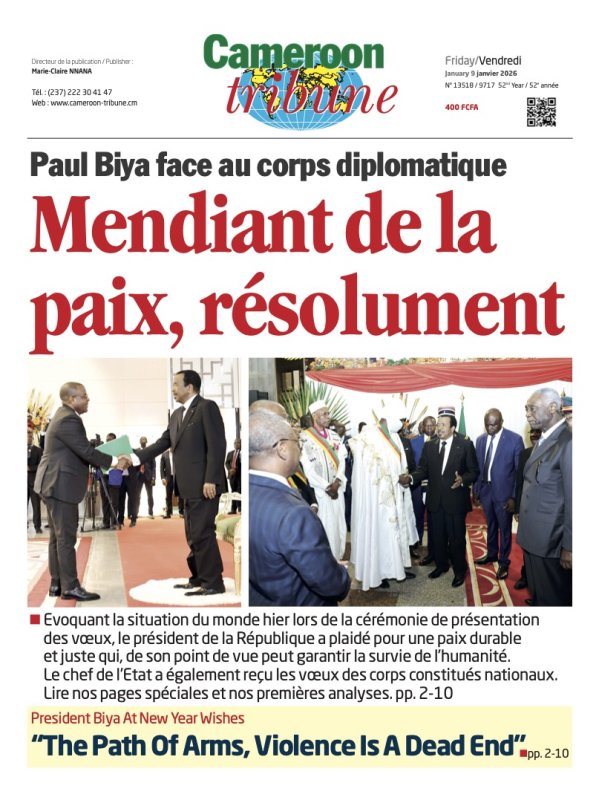Poverty Alleviation: Pursuing Hope-raising Initiatives
- Par Godlove BAINKONG
- 22 Jul 2024 14:00
- 0 Likes
A recent two-week media tour (July 1-14, 2024) of some German-sponsored projects in the West, Littoral, Centre and East Regions of Cameroon has opened the eyes of many within and without the country on the impact of the longstanding Cameroon-German cooperation in the lives of the population. In fact, it emerged from the field reports that thanks to people-driven and diverse projects drafted within the framework of over the 60-year-old mutually-beneficial Cameroon-German bonds, the populations of the visited regions have witnessed appreciable improvements in various domains of national life. These include health, social protection and demographic policy, sustainable management of natural resources, good governance, decentralisation, peace and social cohesion. All key areas in the arduous poverty-relief drive.
It is indicated that many positive results have been recorded thus far. For instance, in the area of governance, decentralisation, peace and social cohesion, nearly 2.7 million people are said to have benefited from modern socio-economic infrastructure (potable water supply, solar energy, markets et al) in some 30 towns across the country. 15,675 citizens have also been trained in local finance, infrastructure management, digital skills and civil status. Thanks to the German-sponsored projects within the framework of Cameroon-German cooperation, digital services and platforms have equally been provided at multimedia centres in rural communities and they are enabling over 6,900 people in three pilot councils, mostly school children, to take part in interactive civic activities notably e-learning and e-goods trading.
With regards to sustainable management of natural resources, 18 value chains have been developed, with technical and structural innovations introduced, to increase the profitability and sustainability of the beneficiary populations, estimated at more than 5,000 people in the Centre, East, West and Littoral regions, etc. It is equally on record that more than 13,000 people, most of them women, have developed their entrepreneurial skills in non-timber forest product activities thanks to training in certain regions such as the East and Centre. More than 15,000 internally displaced women continue to receive technical and financial support to set up their income-generating activities. In the major cities of Yaounde and Douala, more than a hundred young entrepreneurs are benefiting from the same treatment.
In Douala, for example, a group of young people have reportedly launched a wholly Cameroonian chocolate factory, which has not only created jobs, but is also enabling the small business to generate an average annual turnover of FCFA 93 million. Still, some 33 forest, agroforestry and forest product nurseries have been set up, including 27 in the degraded areas of the Bamboutos Mountains in the West Region, where three million euros (about FCFA 1.9 billion) has been invested to breathe new life into these areas, which are under heavy pressure from farming, uncontrolled deforestation and shifting livestock farming.
These are laudable achievements from a people-centred initiative and by a bilateral partner who has proven to be a friend indeed. Germany, being far ahead of Cameroon in terms of socio-economic development, has well understood the problem of its partner and has stepped in where their impact will be well felt. They took time off to understand that despite Cameroon government’s unwavering pursuit of transforming the country into an emerging economy as outlined in its Vision 2035, the reality on the ground presents basic hitches which if not handled, could hinder the realisation of the lofty dream. It is common knowledge, for people who can compare two or more things, that the administrative system in Cameroon on the national and community level still lacks efficiency and transparency and faces challenges in key areas such as agriculture, the sustainable use of resources and healthcare. Visibly, municipalities still have only limited possibilities for ensuring basic services for the population. Designing local development to be inclusive and permanent is still challenging.
It is also known that due to its geographical location and ecological diversity, Cameroon has considerable potentials for agriculture and livestock. Yet, overall yields are low and food insecurity affects more of rural households. Moreover, access to...
Cet article complet est réservé aux abonnés
Déjà abonné ? Identifiez-vous >
Accédez en illimité à Cameroon Tribune Digital à partir de 26250 FCFA
Je M'abonne1 minute suffit pour vous abonner à Cameroon Tribune Digital !
- Votre numéro spécial cameroon-tribune en version numérique
- Des encarts
- Des appels d'offres exclusives
- D'avant-première (accès 24h avant la publication)
- Des éditions consultables sur tous supports (smartphone, tablettes, PC)











Commentaires